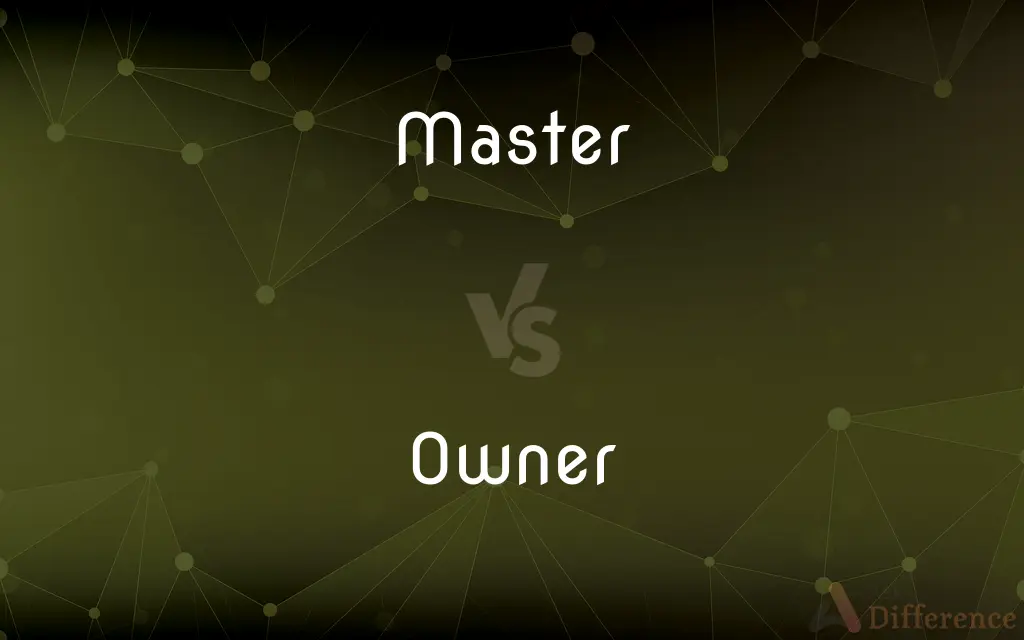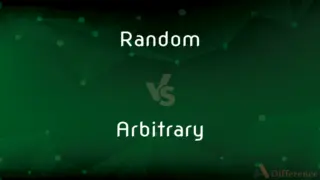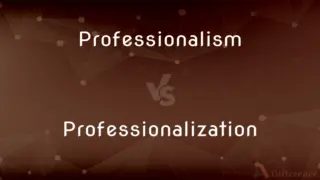Master vs. Owner — What's the Difference?
By Maham Liaqat & Fiza Rafique — Updated on April 4, 2024
A master possesses control or authority, often over skills or subjects, while an owner holds legal title to property or assets.

Difference Between Master and Owner
Table of Contents
ADVERTISEMENT
Key Differences
The term "master" implies a high level of skill, expertise, or dominance in a particular field or activity. It can refer to someone who has achieved a level of proficiency that allows them to control or direct others within that domain. In contrast, "owner" denotes a legal or rightful claim to possession of an object, property, or entity. Ownership is defined by legal rights and responsibilities towards the owned item, irrespective of the owner's skill or expertise related to the item.
Mastery is often associated with individuals who have dedicated significant time and effort to developing their skills or knowledge in a specific area, such as a craft, subject, or profession. This can include masters in art, where the individual's creative skills set them apart, or a master craftsman, who has reached the pinnacle of skill in their trade. Ownership, however, requires no inherent skill in or knowledge of the object of ownership; it is purely a legal or societal acknowledgment of one's rights to control, use, or dispose of property.
In historical contexts, "master" could also refer to a person who had authority over others, such as servants or apprentices, indicating a hierarchical relationship based on control and guidance rather than ownership. In modern usage, it might also denote a teacher or someone who imparts knowledge. The concept of ownership, however, has remained consistent over time, primarily focusing on the legal and economic aspects of possessing assets or properties.
The recognition of mastery is often the result of external validation by peers, institutions, or through the attainment of certain qualifications, reflecting an acknowledged level of excellence or authority in a domain. Ownership is established through legal documentation or societal consensus, validated by legal systems or community standards, and is not necessarily contingent upon external acknowledgment of skill or proficiency.
In some contexts, the terms can intersect; for example, a business owner might also be a master of the craft around which the business is centered, combining legal control with a high degree of skill or knowledge. However, the distinction lies in the nature of the relationship with the subject: mastery through skill and authority, and ownership through legal rights.
ADVERTISEMENT
Comparison Chart
Basis
Skill, expertise, or authority
Legal rights or title
Context
Professional, artistic, or academic fields
Property, assets, or entities
Implication
Control or dominance over a domain or individuals
Legal control and rights to use, manage, or dispose of property
Requirement
Proficiency, knowledge, or experience
Legal documentation or societal acknowledgment
External Validation
Often necessary, through peers or qualifications
Established through legal systems or community standards
Compare with Definitions
Master
Holds control or dominion in certain situations or over people.
As the master of the workshop, he guided apprentices with a firm yet fair hand.
Owner
Entails the legal rights to use, manage, and dispose of property.
As the land owner, she was responsible for any activities that took place on her property.
Master
An individual with superior knowledge or skill in a particular area.
The master chef prepared a meal that amazed everyone with its complexity and flavor.
Owner
The legal possessor of property, a business, or an asset.
The owner of the bookstore decided to extend its operating hours.
Master
Achieved through extensive study or practice.
Her mastery of the violin was evident in her breathtaking performances.
Owner
Having control over an asset's use and disposition.
As the owner of the patent, he had complete control over its use.
Master
Used in various professions or areas of expertise to denote a high level of skill.
He was awarded the title of Master Gardener after completing the advanced course.
Owner
Often used interchangeably with owner, especially in business contexts.
The proprietor of the café introduced a new line of organic teas.
Master
The process or state of being a master.
Achieving mastery in martial arts requires years of dedication.
Owner
The official legal ownership of an asset or property.
The car's ownership document confirmed him as the new owner.
Master
One who has control over or ownership of something
The master of a large tea plantation.
Owner
A person who owns something
Restaurant owners
The proud owner of a huge Dalmatian
Master
The owner or keeper of an animal
The dog ran toward its master.
Owner
Of or belonging to oneself or itself
She makes her own clothes.
Master
The owner of a slave.
Owner
That which belongs to one
I wanted a room of my own.
Master
An employer.
Owner
To have or possess as property
Owns a chain of restaurants.
Master
The man who serves as the head of a household.
Owner
To have control over
For a time, enemy planes owned the skies.
Master
One who defeats another; a victor
I had to admit that I had met my master and so conceded the game.
Owner
To admit as being in accordance with fact, truth, or a claim; acknowledge
"I own that I have been sly, thievish, mean, a prevaricator, greedy, derelict, / and I own that I remain so yet" (Walt Whitman).
Master
One who acts out the role of the dominating partner in a sadomasochistic relationship.
Owner
To make a full confession or acknowledgment
When confronted with the evidence the thief owned up to the crime.
Master
The captain of a merchant ship. Also called master mariner.
Owner
One who owns something.
The police recovered the stolen car and returned it to its owner.
Master
One whose teachings or doctrines are accepted by followers.
Owner
The captain of a ship.
Master
Master(Christianity) Jesus.
Owner
One who owns; a rightful proprietor; one who has the legal or rightful title, whether he is the possessor or not.
Master
A male teacher, schoolmaster, or tutor.
Owner
(law) someone who owns (is legal possessor of) a business;
He is the owner of a chain of restaurants
Master
One who holds a master's degree.
Owner
A person who owns something;
They are searching for the owner of the car
Who is the owner of that friendly smile?
Master
An artist or performer of great and exemplary skill.
Master
An old master.
Master
A worker qualified to teach apprentices and carry on the craft independently.
Master
An expert
A master of three languages.
Master
Used formerly as a title for a man holding a naval office ranking next below a lieutenant on a warship.
Master
Used as a title for a man who serves as the head or presiding officer of certain societies, clubs, orders, or institutions.
Master
Master Used as a title for any of various male officers having specified duties concerning the management of the British royal household.
Master
Master Used as a courtesy title before the given or full name of a boy not considered old enough to be addressed as Mister.
Master
(Archaic) Used as a form of address for a man; mister.
Master
One who is appointed to assist a court in the performance of certain legal functions, such as the taking of testimony and calculating damages in complex litigation. Also called special master.
Master
Master A man who owns a pack of hounds or is the chief officer of a hunt.
Master
An original, such as an original document or audio recording, from which copies can be made.
Master
Of, relating to, or characteristic of a master.
Master
Principal or predominant
A master plot.
Master
Controlling all other parts of a mechanism
A master switch.
Master
Highly skilled or proficient
A master thief.
Master
Being an original from which copies are made.
Master
To become very skilled in or knowledgeable about
Mastered the language in a year's study.
Master
To overcome or defeat
He finally mastered his addiction to drugs.
Master
To produce a master copy of (an audio or video recording, for example).
Master
Someone who has control over something or someone.
Master
The owner of an animal or slave.
Master
(nautical) The captain of a merchant ship; a master mariner.
Master
(dated) The head of a household.
Master
Someone who employs others.
Master
An expert at something.
Mark Twain was a master of fiction.
Master
A tradesman who is qualified to teach apprentices.
Master
(dated) A schoolmaster.
Master
A skilled artist.
Master
(dated) A man or a boy; mister. See Master.
Master
A master's degree; a type of postgraduate degree, usually undertaken after a bachelor degree.
She has a master in psychology.
Master
A person holding such a degree.
He is a master of marine biology.
Master
The original of a document or of a recording.
The band couldn't find the master, so they re-recorded their tracks.
Master
(film) The primary wide shot of a scene, into which the closeups will be edited later.
Master
(legal) A parajudicial officer (such as a referee, an auditor, an examiner, or an assessor) specially appointed to help a court with its proceedings.
The case was tried by a master, who concluded that the plaintiffs were the equitable owners of the property....
Master
A device that is controlling other devices or is an authoritative source.
A master wheel
A master database
Master
(freemasonry) A person holding an office of authority, especially the presiding officer.
Master
(by extension) A person holding a similar office in other civic societies.
Master
(BDSM) A male dominant.
Master
A vessel having a specified number of masts.
A two-master
Master
Masterful.
A master performance
Master
Main, principal or predominant.
Master
Highly skilled.
Master batsman
Master
Original.
Master copy
Master
(intransitive) To be a master.highly ambiguous, master in what sense?
Master
(transitive) To become the master of; to subject to one's will, control, or authority; to conquer; to overpower; to subdue.
Master
(transitive) To learn to a high degree of proficiency.
It took her years to master the art of needlecraft.
Master
To own; to possess.
Master
To make a master copy of.
Master
To earn a Master's degree.
He mastered in English at the state college.
Master
A vessel having (so many) masts; - used only in compounds; as, a two-master.
Master
A male person having another living being so far subject to his will, that he can, in the main, control his or its actions; - formerly used with much more extensive application than now.
Master
One who uses, or controls at will, anything inanimate; as, to be master of one's time.
Master of a hundred thousand drachms.
We are masters of the sea.
Master
One who has attained great skill in the use or application of anything; as, a master of oratorical art.
Great masters of ridicule.
No care is taken to improve young men in their own language, that they may thoroughly understand and be masters of it.
Master
A title given by courtesy, now commonly pronounced mĭster, except when given to boys; - sometimes written Mister, but usually abbreviated to Mr.
Master
A young gentleman; a lad, or small boy.
Where there are little masters and misses in a house, they are impediments to the diversions of the servants.
Master
The commander of a merchant vessel; - usually called captain. Also, a commissioned officer in the navy ranking next above ensign and below lieutenant; formerly, an officer on a man-of-war who had immediate charge, under the commander, of sailing the vessel.
Master
A person holding an office of authority among the Freemasons, esp. the presiding officer; also, a person holding a similar office in other civic societies.
Throughout the city by the master gate.
Master
To become the master of; to subject to one's will, control, or authority; to conquer; to overpower; to subdue.
Obstinacy and willful neglects must be mastered, even though it cost blows.
Master
To gain the command of, so as to understand or apply; to become an adept in; as, to master a science.
Master
To own; to posses.
The wealthThat the world masters.
Master
To be skillful; to excel.
Master
An artist of consummate skill;
A master of the violin
One of the old masters
Master
A person who has general authority over others
Master
A combatant who is able to defeat rivals
Master
Directs the work of other
Master
Presiding officer of a school
Master
An original creation (i.e., an audio recording) from which copies can be made
Master
An officer who is licensed to command a merchant ship
Master
Someone who holds a master's degree from academic institution
Master
An authority qualified to teach apprentices
Master
Key that secures entrance everywhere
Master
Be or become completely proficient or skilled in;
She mastered Japanese in less than two years
Master
Get on top of; deal with successfully;
He overcame his shyness
Master
Have dominance or the power to defeat over;
Her pain completely mastered her
The methods can master the problems
Master
Have a firm understanding or knowledge of; be on top of;
Do you control these data?
Common Curiosities
Can mastery be transferred like ownership?
Mastery cannot be transferred because it is an intrinsic attribute of an individual, based on their skills and knowledge. Ownership, however, can be transferred legally.
What defines a master in a field?
A master is defined by their superior skill, expertise, and often authority in a particular domain, achieved through extensive experience or study.
How is mastery recognized?
Mastery is usually recognized through external validation, such as qualifications, peer acknowledgment, or demonstrable achievements in the field.
Can a person be a master without formal recognition?
Yes, a person can be considered a master through demonstrable skill and knowledge, even without formal recognition or titles.
Is ownership always legal?
Ownership is typically a legal concept, recognized and protected by law, though it can also be recognized through societal or community standards.
What happens to mastery when the master passes away?
Mastery, as a personal achievement, ends with the individual, though their techniques, teachings, and influence can continue to impact the field.
Can an owner also be a master?
Yes, an individual can be both an owner and a master if they possess legal rights to something and have also achieved a high level of skill or authority related to it.
Does ownership require skill?
Ownership does not inherently require skill in or knowledge of the item owned; it is based on legal rights or titles.
What responsibilities come with ownership?
Ownership carries responsibilities such as maintaining the property, paying any dues or taxes associated with it, and ensuring its use does not harm others.
Is it possible to lose mastery?
Mastery might diminish without practice or updating skills, but foundational knowledge and skill levels typically remain strong.
How does one become a master in their field?
Becoming a master typically requires years of dedicated study, practice, and often mentorship, along with a commitment to continual learning and improvement.
What legal documents prove ownership?
Legal documents such as titles, deeds, registration papers, or ownership certificates can prove ownership.
Can ownership be shared?
Yes, ownership can be shared among multiple individuals or entities, as in joint ownership or partnership arrangements.
Does mastery imply teaching?
While mastery does not inherently imply teaching, many masters choose to share their knowledge and skills with others, often through teaching or mentorship.
How does society benefit from masters and owners?
Society benefits from masters through the advancement of knowledge, skill, and cultural heritage, and from owners through the responsible management and development of resources and businesses.
Share Your Discovery

Previous Comparison
Random vs. Arbitrary
Next Comparison
Professionalism vs. ProfessionalizationAuthor Spotlight
Written by
Maham LiaqatCo-written by
Fiza RafiqueFiza Rafique is a skilled content writer at AskDifference.com, where she meticulously refines and enhances written pieces. Drawing from her vast editorial expertise, Fiza ensures clarity, accuracy, and precision in every article. Passionate about language, she continually seeks to elevate the quality of content for readers worldwide.














































